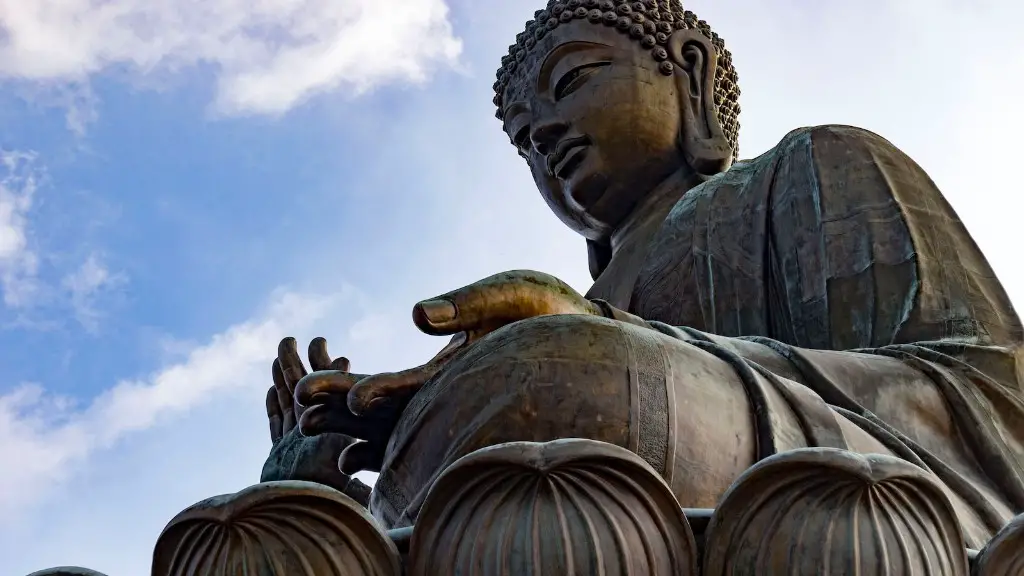Hinduism is one of the oldest known living religions and still practised widely by millions of people in India and around the world today. Within the vast complexities of Hinduism, spirituality is a fundamental factor which plays an important role in shaping the beliefs, rituals and behaviour of many of its adherents. At its core, spirituality is the path to inner knowledge and lasting spiritual satisfaction, providing guidance on how to live an ethically meaningful life.
Spirituality in Hinduism is typically oriented around the divine relationship between Atman, the spiritual self, and Brahman, the supreme divine reality. The scriptures of Hinduism, such as the Vedas and Upanishads, explain the principles by which individuals should seek a realization of the ultimate divine unity. By realizing the inseparable unity of Atman and Brahman, individuals can understand the divinity within themselves and develop spiritual knowledge and lasting inner peace.
For many believers, Hinduism provides a framework for spiritual growth that includes rituals, emotional and ethical practices, and prayer. Devotional practices are an important part of the spiritual path, connecting individuals to the divine through invocation and meditation. Additionally, Hindus have traditionally explored the unity of Atman and Brahman through spiritual guidance of gurus, who provide insight and direction for an individual’s journey.
The ethical tenets of Hinduism also form a crucial factor in cultivating spirituality. Hindus live by the principles of Dharma, which entails living a virtuous life and following certain moral codes that exhibit respect and honour to all. By living in harmony with Dharma and recognizing karma, the consequences of past actions, Hindus understand the divine unity and cultivate spirit-centredness.
Moreover, traditional Hindu practices including yoga, meditation and chanting are cultivated as an essential part of Hindu spirituality. Yoga is a system involving physical postures and breath control, while meditation involves practices such as mindfulness and silent contemplation. Through these practices, individuals strive to cultivate self awareness, mental and emotional equanimity, and connection with the divine.
Although Hindu spirituality encompasses beliefs and practices from a variety of sources and is far too complex to cover comprehensively in this article, one of the key components of Hindu spirituality is the quest for inner peace and union with the Ultimate. This journey of spiritual growth is ultimately undertaken for the purpose of self-discovery and enlightenment, and allows for a harmonious way of life.
The Role of Nature
The practice of Hinduism is often articulated through an appreciation of nature. Hindus view nature as a manifestation of the divine, with both humans and the environment being interconnected and interdependent.This principle of interconnectedness is essential to Hindu spirituality and works to reunite man with the divine truth. Nature is therefore deeply intertwined with Hinduism and is linked inextricably to many of its spiritual practices and beliefs, offering individuals a means by which to connect with the divine.
Ultimately, nature is seen as a source of spiritual grounding and allows humans to look inward and find guidance and peace from the divine. By understanding the metaphysical connection between humans and the environment, they can appreciate the inherent beauty and unity of nature and develop a greater understanding of the spiritual aspect of their own lives.
Sacred Texts
Hinduism has generated a large body of spiritual texts that reflect the beliefs expounded by spiritual teachers and seers. These texts include scriptures such as the Rig Veda, Upanishads, and many others. These Hindu religious texts provide guidance and inspiration to adherents, allowing them to become knowledgeable in both religious and theological perspectives, as well as providing insight into ethical behaviour and spiritual growth.
Furthermore, these texts provide a comprehensive framework for understanding and exploring Hindu spirituality, offering adherents the ability to attain a deeper and more meaningful level of spiritual insight. By studying these teachings, and applying their wisdom in their daily lives, followers of Hinduism are able to understand the divine unity and cultivate spiritual fulfilment.
Holy Symbols
Hindu spiritual symbols play a vital role in the lives of believers, offering a visual focus for spiritual devotion. Symbols such asAum (the divine sound of Brahman), the trisula (trident) and the swastika are important religious emblems, conveying the many aspects of divine truth. These symbols represent the principles of Hinduism, providing a physical reminder of the divine unity and acting as a source of spiritual inspiration and guidance.
Hindu symbols often appear in temples, on murals and in other religious contexts, conveying powerful spiritual messages and allowing adherents to see the deeper meaning behind their faith. By looking at these symbols, and reflecting on their significance, individuals are able to understand the divine truth and practice Hinduism in a meaningful way.
Conclusion
Spirituality in Hinduism forms the basis for many of its adherents’ beliefs, connecting them to their ultimate source of power, peace and unity. From devotional practices to ethical principles, from nature to sacred symbols, Hinduism incorporates many pathways to spirituality that unite its adherents with the divine truth. Furthermore, by studying religious scriptures and discerning the symbols of their faith, those who follow Hinduism are able to comprehend the deeper metaphysical implications of their belief and practice their religion in a meaningful manner.

